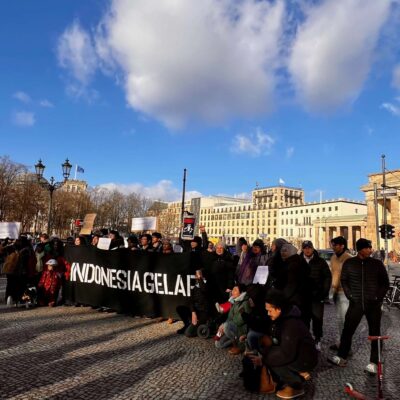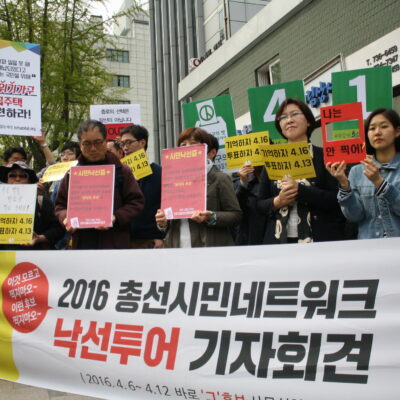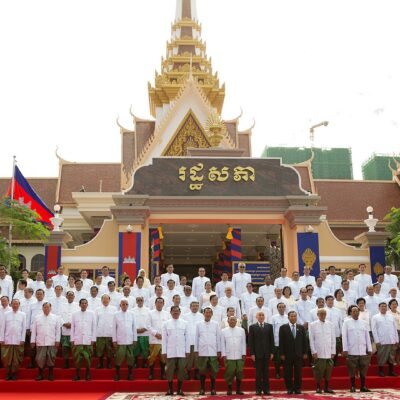At the end of May 2013, an activist-based resistance started against the attempt of the government let by Recep Tayyip Erdoğan to destroy Gezi Park in Istanbul in order to build a shopping mall. Within two days it had turned into the largest social mobilisation in Turkey’s modern history. Gezi Park remained under the control of the demonstrators until mid-June 2013, after which the confrontation between the police and the demonstrators continued in different areas of Istanbul while mass protests were organised in almost all of Turkey. A protest to protect a park in the city-centre from the Erdogan government’s strategy of economic growth based on the construction sector turned into a civic and democratic uprising against an increasingly authoritarian government. Eight people who participated in the demonstrations lost their lives.
Several prominent figures of the Gezi protests were prosecuted by the state. The so-called Gezi Trial lasted eight years before concluding on April 25, 2022. Osman Kavala, a businessperson and a human rights advocate, who had already been in prison for 1,637 days, was given a life sentence on the charge of attempting to overthrow the government. His co-defendants, Mücella Yapıcı, Çiğdem Mater, Ali Hakan Altınay, Mine Özerden, Tayfun Kahraman, Can Atalay, and Yiğit Ali Emekçi, were all sentenced to 18 years imprisonment for aiding the same crime. Opponents of Erdogan’s presidential government think that both Kavala’s long detention and the judgments announced on April 25 are not legal. That is, rather than a judicial process, the trial was a punishment process carried out by the government of Erdoğan.
The Gezi protest was not a social and political movement with a well-defined agenda, but rather a gathering of individuals and various groups who felt that enough was enough, in Gezi Park and in many areas of the country, responding to and resisting reckless police violence (see the last chapter of this collection). It had no distinct political colour: supporters of nationalist, far-right parties were there, as were supporters of socialist and social democratic parties. The social background of those involved was also mixed: people from poor working-class neighborhoods, young university students increasingly doomed to precarious jobs, white-collar professionals, and even the children of well-known capitalists. The militants of the revolutionary left, who had previous experience of clashing with the police and mostly came from poor neighbourhoods, shared the same barricades with protestors from high income backgrounds. Alevis, excluded by the dominant Sunni Islam in Turkey, Kurds, football club fan groups, LGBTI+ activists, civil servants, and labour unions all flocked to Gezi Park. Gezi was a spontaneous civil and democratic uprising against the increasingly authoritarian and unlawful practices of the AKP (Justice and Development Party) government.
There was not, and could not be, a centre strong enough to direct and lead such a large spontaneous social mobilisation. Nevertheless, an interlocutor emerged under the name of Taksim Solidarity. Rather than leading the masses confronting the police on the streets, it became a loose centre trying to express the demonstrators’ demands and meet the varied logistical needs of the two-week-plus occupation around Gezi Park, from food to emergency aid for the injured. Although Taksim Solidarity contained various sub-organisations—such as political organisations, trade unions, activist-based groups, and NGOs—at its centre were occupational associations of professionals from areas such as the law, medicine and engineering, where left-wing tendencies have always been dominant. Thus, as an umbrella organisation, Taksim Solidarity was able to assume a partial interlocutor role regarding the government. Many of those arrested and mentioned above played an active role in Taksim Solidarity.
Although Gezi rapidly became a basic reference point for almost all social and political movements, Turkey has undergone a series of elections where the dynamics of mainstream politics have become the main reference point again for political change. Local elections in 2014 were followed by two general elections held in the summer and autumn of 2015. After the referendum on the presidential system in 2017, the first presidential election was held in 2018, followed by local elections in 2019. All of these elections, whether local or general, took place amid extreme polarisation between those dedicated to the AKP and those vehemently opposed. Next year, in June 2023, presidential elections will be held again.
Although the Gezi Spirit raised hopes for the electoral defeat of the AKP, it has gradually retreated in the face of increasing authoritarianism. Three major events were decisive in cementing the authoritarian orientation of the regime.
The first was Gezi itself. After Gezi, AKP definitively lost the reformist character attributed to it by liberal circles and lost its capacity to appeal to constituencies other than its own.
The second occurred in the 2015 June elections, when the HDP (People’s Democratic Party), the left-wing legal party of the Kurdish movement, entered parliament as the third largest party with the largest vote share (13 percent) in its history. In the aftermath of Gezi, the HDP, which until then had been a party addressing Kurds in Turkey, adopted a strategy of becoming a party for the whole of Turkey. The HDP gained both the support of conservative Kurds who had until then voted for the AKP and popularity among the Turkish population in Western provinces thanks to the effects of Gezi as a shared experience. Demirtaş, the leader of the HDP, who was arrested in 2016 and has been in jail ever since, has enjoyed very high popularity even among Turks. After this election, in which Erdoğan’s AKP could not win enough seats to form a single-party government, it chose to rerun the elections in November of the same year. Between these two election periods, the Turkish military and police special operations forces heavily attacked both the civil and military bases of the Kurdish movement. The dark political atmosphere from June to November bore fruit: Although HDP again narrowly overcame the 10 percent parliamentary threshold, AKP won an absolute majority. Since then the enormous pressure on the Kurdish movement has increased continuously due to developments in northern Syria.
The third was the attempted coup in 2016 by soldiers affiliated with the Gülen Community, which until then had been an ally of AKP. In response, the government declared a state of emergency that lasted approximately two years. Nearly 300,000 people were detained, nearly 100,000 were arrested, and over 125,000 were dismissed from public service. The presidential system declared by Erdoğan in 2015 became official following a referendum in 2017, thereby completing the transition to an authoritarian regime in Turkey.
The preceding paragraphs make clear Turkey’s interesting and unique political situation of deep authoritarianisation accompanied by a series of elections. Street politics, such as Gezi, have been suppressed by this increasing authoritarianism. Under the new regime, where the police have gained enormous power, the possibilities for activist-based street politics have decreased dramatically. In Turkey, where arbitrary use of criminal law and long-term detention has become common, exposure to police violence may not be the only result of participating in street politics. For example, in August this year, Gülşen, a well-known Turkish pop-singer, was arrested, placed under house arrest and charged with inciting hatred after she made a joke about religious schools. She had previously been criticised by conservatives for unfurling an LGBTI+ flag at one of her concerts.
Nevertheless, activist-based street politics is resurrected when women take to the streets to oppose increasing levels of male violence and femicide, or when LGBTI+ groups and individuals living under great discrimination demonstrate. To these, it is possible to add the courageous resistance of university students in October 2021 to governmental interference with Boğaziçi University and METU, Turkey’s best public universities. The labor movement, on the other hand, has stagnated since a wave of strikes in the metal sector in 2015. Interestingly, this has continued despite inflation of 80 percent according to the state’s official statistical institution, while actual inflation has reached triple digits.
Can we explain this retreat of street politics only with reference to authoritarianism and oppression? Immediately after Gezi, the title of a public debate organised by a political group founded by people who took an active role in Gezi was ‘Gezi does not fit in the ballot box’. But as state oppression increased, radical, social activist movements were more constrained to think in terms of an electoral strategy rather than other action. On the day of the November 2015 general elections, a particular tweet symbolised this frustrated political state: an anarchist reflecting on his own tragicomedy for volunteering as a poll worker for the Kurdish people’s main representative, HDP, which was under particularly heavy pressure during this election process. This is not beyond comprehension. It was not Turkey’s powerful and massive social movements that created the Gezi uprising. On the contrary, after the 1980 coup, social movements in Turkey gradually weakened and their social influence gradually decreased, especially throughout the 2000s. After Gezi, as government oppression intensified, electoral politics had gradually, and inevitably, replaced the politics of streets and open places.
Meanwhile, Turkey’s mainstream political opposition adopted a strategy of forming coalitions. The centre-left CHP (Republican People’s Party) gradually gathered other opposition parties around an electoral coalition, dubbed the Nation Alliance, as against Erdoğan’s People’s Alliance. The 2019 local elections, in which the CHP-candidates won Istanbul and Ankara, marked a turning point by showing that Erdoğan and AKP could be defeated. Particularly, the victory in Istanbul, which had been governed by Islamist-conservative parties since 1994 and had a budget larger than some countries, had become a morale booster for the opposition. This was made possible by the decisions of the opposition parties, including the HDP, not to nominate their own candidates and support CHP candidates. Today, the opposition, now called ‘Table for Six’, consists of six parties by excluding the HDP due to the strong nationalism that cuts across the bases of all Turkish political parties, yet expects to receive support from Kurds from outside. In light of Erdogan’s declining approval ratings against a background of deepening economic recession, one may expect the opposition’s electoral success next year. While it’s possible Erdogan will create something unexpected or cancel the election, the opposition’s capacity and willingness to win is of equal importance.
For this reason, Kemal Kılıçdaroğlu, the leader of the CHP, and other leaders of the opposition have demanded absolute calm throughout this delicate period leading up to the election in 2023. In particular, they fear that any mass opposition movement that spills onto the streets will enable Erdogan to ban or postpone the elections. Recently, Brazil’s opposition organised mass street demonstrations in case incumbent Jair Bolsonaro refused to recognise the results of October’s general and presidential elections. Yet, despite the same risk in Turkey, the opposition alliance does not want such a social mobilisation; indeed, most people do not intend to protest on the streets. These days, the Gezi spirit maintains its credibility in mainstream opposition politics to the extent that it is a useful reference point for the anti-AKP opposition. In a recent speech, for example, Meral Akşener, head of İYİP (the Good Party), CHP’s main partner and a splinter party from Turkey’s longstanding fascist party, MHP (Nationalist Movement Party), hailed Gezi protesters as the current actors of Turkey’s modernisation.
In 2013 the leader of the main opposition party Kemal Kılıçdaroğlu called on CHP supporters to join Gezi, but since 2015 he has followed another strategy, as seen in the ‘Justice March’ that he organised to protest the court decision that imprisoned a CHP deputy. Kılıçdaroğlu, who was 70 at the time, walked 420 kilometres alone from the capital city Ankara to Istanbul in 25 days, carrying a banner saying ‘Justice’. This long march of Gandhi Kemal (one of his nicknames), which ended with a rally in Istanbul, was undoubtedly a creative, courageous, and inspiring event. However, it was also confusing. Was the leader of the main opposition saying to Erdoğan, if he didn’t let people take to the streets against injustice, he (Kılıçdaroğlu) will do it? Or was he saying to the people, that they didn’t have to do anything because he was doing it on their behalf? Maybe both are true.
The opposition’s ballot box-based strategy has a realistic chance of succeeding within the purview of mainstream politics. After all, mainstream political actors of the opposition envision a smooth, or at least not catastrophic, transition to democracy. Yet, what if the transition is not smooth? That is a situation none of us want to see in reality and it’s unclear whether the Gezi spirit is able to be recalled.
Although women, LGBTI+ individuals, and university youth have provided examples of struggling for their survival, presence, and future, the flow of time remains suspended in Turkey. Everything from macro issues like hyper-inflation to individual concerns like a civil servant’s expectations of promotion have been postponed to the elections in 2023. Meanwhile, millions of people who filled the streets in 2013 saying enough is enough are trying to keep the Gezi spirit alive on social media.
Image: Gezi Park protestors and police, April 21, 2014. Credit: Sasha Maksymenko/Flickr.




